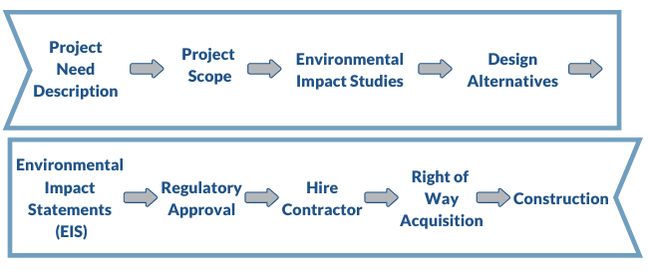South Carolina Eminent Domain AttorneysDecades of Experience Assisting South Carolina LandownersFor more than 35 years, Lewis Babcock has helped landowners receive just compensation after a government entity or utility seizes their property through condemnation.
Litigation of Landmark CasesOur innovative approach to condemnation and land use litigation has helped place our firm at the forefront of these complex areas of law. Our lawyers successfully represented a South Carolina landowner before the United States Supreme Court in the landmark regulatory taking case, Lucas v. South Carolina Coastal Commission. This case, which upheld a landowner’s right to monetary damages when he was prohibited from building residences on his beachfront property, demonstrates our efforts and desire to fight for our client’s right to receive just compensation when a government entity’s actions reduces the value of their land.
RecognitionLewis Babcock founding partner, Keith Babcock is an emeritus member of the Owner’s Counsel of America, a national consortium of eminent domain lawyers representing landowners. Mr. Babcock is a thought leader and sought out lecturer on the topic of eminent domain with decades of speaking engagements before various state and National groups.
Keith Babcock and Joseph Berry are recognized for their work in Eminent Domain by Super Lawyers, Best Lawyers and "Best Lawyers: Ones to Watch." |
Practice Areas |
Is Your Land Part of Carolina Crossroads?Get Maximum Value for Your Property
|
What is Eminent Domain?Eminent domain refers to the government’s power to take private property for public use. The United States Constitution, South Carolina Constitution, and other laws mandate that the owner of any land that is taken by the government is entitled to just compensation, usually defined as the fair market value of the property. Court proceedings to take land under the eminent domain power are typically referred to as a condemnation.
Condemnations vary in degree:
Learn more about the Eminent Domain Procedure. |
Eminent Domain FAQs
I’ve been notified that the government intends to take my property, or a portion of my property, now what?
The power of eminent domain permits the government to take your property for use in a public project, but it must pay you for it.
You are entitled to receive the fair market value of the property the government takes, which includes the value of the land physically taken and any damages inflicted on your remaining land. Fair market value also considers the highest and best use of your property, which could be different from its current use. The government must make you a fair market value offer. The government’s offer should be accompanied by a valuation prepared by a licensed appraiser. You have the right to disagree with the valuation and negotiate with the government.
South Carolina has a statutory process in place under which the government must operate when it decides to take your property. Contact us today to learn more.
You are entitled to receive the fair market value of the property the government takes, which includes the value of the land physically taken and any damages inflicted on your remaining land. Fair market value also considers the highest and best use of your property, which could be different from its current use. The government must make you a fair market value offer. The government’s offer should be accompanied by a valuation prepared by a licensed appraiser. You have the right to disagree with the valuation and negotiate with the government.
South Carolina has a statutory process in place under which the government must operate when it decides to take your property. Contact us today to learn more.
Where can I learn more about the project affecting my property?
Most public projects have public information and public involvement components. The governmental body or its agents will typically provide project information to the public and invite attendance at public meetings and the submissions of questions, comments, or concerns. Certain sources of project funding, such as federal, or certain regulatory approval bodies may also mandate certain aspects of public information and involvement.
Generally, a web search for the project name is a good place to begin your search. Public bodies often provide online access to the project’s status, maps, public comments, and other project related information. If your search does not return any results, contact a representative of the public body that is undertaking the project.
Helpful links:
South Carolina Department of Transportation – Current Projects
Carolina Crossroads
Charleston County Transportation Department
Greenville County Public Works
Richland County Transportation Penny Department
Generally, a web search for the project name is a good place to begin your search. Public bodies often provide online access to the project’s status, maps, public comments, and other project related information. If your search does not return any results, contact a representative of the public body that is undertaking the project.
Helpful links:
South Carolina Department of Transportation – Current Projects
Carolina Crossroads
Charleston County Transportation Department
Greenville County Public Works
Richland County Transportation Penny Department
The government called to tell me it’s taking my land and is coming soon to inspect and survey the property, can it do that?
After first giving reasonable notice to the landowner, the government may enter the property that it purposes to acquire for the limited purposes of making a survey, evaluating the location of proposed improvements, or appraising the property. A court order may be obtained where the landowner refuses to allow entry.
I was told that if I don’t reach an agreement with the government on the value of my land, the government will have to file a condemnation action in court to take my property, is this true?
That is correct, but it is not a reason to accept less than fair market value for your property. When the landowner and the government do not agree on the value of land being taken or damages to the remaining land, the government is permitted to file a condemnation action in court to exercise its power of eminent domain and acquire the property. This does not change landowner’s right to receive the land’s fair market value. The landowner and the government can still reach an agreement at any time after the condemnation action is filed in court. The government must give you at least 30 days to accept or reject their offer of compensation before filing a court action.
If the government has initiated a condemnation action in court to take your property, don’t wait to talk to us about how we may be able to help.
If the government has initiated a condemnation action in court to take your property, don’t wait to talk to us about how we may be able to help.
Does the government have to provide me with an appraisal before taking my land?
Before the government files a condemnation action in court to take your property, it must provide you with an appraisal and make a good faith effort to negotiate the amount of compensation. However, the government and landowner can agree on the amount of compensation for the land at any time, and in certain circumstances the government may make an offer of compensation without first ordering an appraisal. Before the government files a court action to take your property it must provide you with an appraisal.
The government made me an offer for my land, do I have to accept it?
No. You are entitled to receive the fair market value for your property. The United States Constitution and the South Carolina Constitution call this “just compensation.” There can be, and often are, differences in opinion on the fair market value of land. The landowner is always entitled to its own opinion of fair market value and does not have to agree with the government’s valuation.
What is just or full compensation?
Just compensation is the fair market value of the property being taken, plus any decrease in value of the landowner’s remaining property, less any benefits to the landowner’s remaining land due to the public project.
The Fifth Amendment of the U.S. Constitution provides that private property may not be taken for a public use without payment of just compensation. The items for which a property owner may generally attempt to seek full compensation are real property, fixtures and equipment, moving costs, severance damages, interest, attorneys’ fees and costs of expert witnesses. Full compensation for these items is generally the fair market value of the item as of a particular date. Landowners or tenants may also be entitled to recover costs associated with relocating a business and moving personal property. Contact us for info about the factors that affect fair market value.
The Fifth Amendment of the U.S. Constitution provides that private property may not be taken for a public use without payment of just compensation. The items for which a property owner may generally attempt to seek full compensation are real property, fixtures and equipment, moving costs, severance damages, interest, attorneys’ fees and costs of expert witnesses. Full compensation for these items is generally the fair market value of the item as of a particular date. Landowners or tenants may also be entitled to recover costs associated with relocating a business and moving personal property. Contact us for info about the factors that affect fair market value.
I’ve received an offer to acquire my property, how do I know if it is fair?
As a landowner, you have the right to testify to your opinion of the fair market value of your property. Normally, the best way to evaluate your own valuation and the government’s initial offer, is to hire a licensed real estate appraiser that is experienced in appraising property for eminent domain matters.
The eminent domain appraisal is, in most instances, different from the traditional appraisal that you may have obtained to secure bank financing to purchase your property. The eminent domain appraisal must consider the highest and best use of your property and any damages to your remaining land due to the taking.
We can help you select the right appraiser to ensure you receive the fair value for your property.
The eminent domain appraisal is, in most instances, different from the traditional appraisal that you may have obtained to secure bank financing to purchase your property. The eminent domain appraisal must consider the highest and best use of your property and any damages to your remaining land due to the taking.
We can help you select the right appraiser to ensure you receive the fair value for your property.
CAN I CHALLENGE THE AMOUNT OF MONEY THE GOVERNMENT IS WILLING TO PAY FOR MY CONDEMNED PROPERTY?
Yes. You are entitled to full compensation for any taking. Therefore, you are entitled to challenge the government if you feel their initial offer was not appropriate.
My mortgage has a prepayment penalty, am I stuck paying that fee after the government takes my property?
No. Generally, your lender may not impose a prepayment penalty on debt paid off as part of a condemnation action. Where a penalty is required, it is generally the government’s responsibility to pay.
The government has filed a condemnation action against me, now what?
Generally, condemnation actions proceed like any other civil litigation matter. This means that there will be a period of discovery, which is an exchange of information typically through interrogatories (written questions) and requests to produce documents relevant to the property. The parties will also likely take depositions (sworn testimony taken outside of court), typically of the landowner, the government representatives, and any appraisers or other expert witnesses. Prior to trial, the parties will engage in mediation.
Lewis Babcock has experience walking clients through each of these stages of litigation. Contact us today.
Lewis Babcock has experience walking clients through each of these stages of litigation. Contact us today.
If the government files a condemnation action, am I able to access the offer of just compensation deposited with the court before the conclusion of the court case?
Yes. A landowner is statutorily entitled to withdraw at least 50% of the amount the government determined to be just compensation and deposited with the court. For projects with certain types of funding, such as federal funds, a landowner may be entitled to withdraw 100% of the funds the government deposited. If the ultimate determination of compensation is less than the landowner withdrew, the landowner would be responsible to pay funds back to the government. Withdrawing the funds on deposit with the court does not prevent the landowner of seeking more compensation.
Do I have the right to demand that a jury hear my case?
Yes. A condemnation case is tried before a jury unless the landowner and government both agree to waive a jury trial.
If a condemnation action is filed in court, am I entitled to receive interest on the amount ultimately determined to be just compensation?
Yes. The government is required by statute to pay 8% a year on the amount ultimately determined to be just compensation. The total amount could vary depending on whether the funds deposited by the government were withdrawn by the landowner during the condemnation action.
When a condemnation action is filed, what is the date of valuation for my property?
In a condemnation action, the landowner’s property is valued as of the filing date of the condemnation. Even though a court action may take months, or years, to conclude, the valuation date remains fixed as the original court filing date.
Can I challenge the government’s right to take my property?
Yes, in very limited circumstances the landowner may initiate a right-to-take challenge. A landowner can challenge the government’s right to take their property by initiating a separate legal action within thirty days of being served with the condemnation notice. This type of action may challenge the public use of the property and public benefit of the project. A right-to-take challenge automatically stays the condemnation action until its resolution. If the right-to-take challenge was not raised and litigated in good faith, the court must award the government its reasonable costs and litigation expenses.
IF I AM SUCCESSFUL IN CHALLENGING THE GOVERNMENT’S EFFORTS TO TAKE MY PROPERTY, WILL I BE RESPONSIBLE FOR MY OWN ATTORNEYS’ FEES AND COSTS?
Where a property owner successfully challenges the government’s right to take his or her property by eminent domain/condemnation, the law provides that the eminent domain/condemnation proceeding may be dismissed. The property owner generally is then entitled to recover his or her litigation expenses including attorneys’ fees and reasonable costs incurred in the eminent domain/condemnation action.
Contact Lewis Babcock About Your Eminent Domain Case
Lewis Babcock can help you obtain compensation for your property. Call our office today at (803) 771-8000 to arrange an appointment today.










